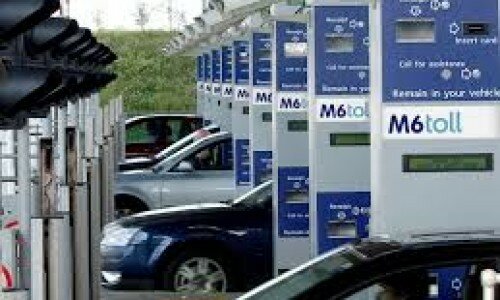
M6 Toll confirms £28.6m loss, as councils issue ‘make the road free’ demand
The M6 Toll registered a £28.6 million loss last year, raising fresh questions about the long term viability of the privately owned road.
The performance was slightly better than the previous year’s £32.5 million loss, and passenger volumes increased by five per cent, but owners Midland Expressway admitted that more motorists were using the Toll only because road works on the M6 forced them to find a different route.
In its annual accounts, Midland Expressway states:
Traffic volumes have continued to benefit from roadworks in place on the competing section of the M6. The company’s toll revenues benefitted significantly in 2014 as a result. The roadworks have continued into 2015 and the company has benefitted from traffic volumes in excess of those seen in 2014.
But the report warns:
The improvement to traffic flows for the M6 currently being experienced are expected to end once the M6 works on the competing sections are eventually completed. In the absence of other work programmes, traffic flows and revenues for the M6 Toll longer term may be challenged accordingly.
The future of the loss-making toll road is being discussed at Government level as part of the shadow West Midlands Combined Authority’s devolution negotiations. Council leaders want to make the toll road free for motorists to use, at an estimated cost of £15 million a year, and claim such a move would ease congestion on the M6 and generate economic benefits of at least £1.2 billion.
The M6 Toll, formerly known as the Birmingham Northern Relief Road, opened in December 2003. It connects Junction 3a of the M6 at Coleshill to Junction 11a of the M6 at Cannock.
The cost of using the road has risen steadily, from £2 each way for cars in 2003 to £5.50 today and from £6 for HGV vehicles to £11.
Midland Expressway says it continues to receive the full support of its debt providers following a successful financial restructuring agreed between itself and its parent company, MMG.
The terms of the restructuring provide the group with an affordable and stable financing platform for the foreseeable future by extending the maturity date and payment terms of MMG’s term debt and swap obligations until 2020.
Toll revenue rose 5.5 per cent to £69.54 million last year with traffic volumes up 5.2 per cent to 15,408,000.
The company hopes for an increase in revenue off the back of a Government plan to turn the M6 between Birmingham and Manchester into a “smart motorway” with hard shoulder running and variable controlled speed limits.
A new link road connecting the M54, M6 and M6 Toll is among a £1.8 billion package of road improvements, which Midland Expressway expects to benefit toll road users.
Similar Articles
The ins, outs and whereabouts of fly-tipping 0
On the day Birmingham's latest bin strike starts up, Chris Game throws a political dead
Why voter registration matters
In 1967/68, while attempting concurrently to write a PhD thesis (no!) and earn enough to
Brexit Citizens’ Assembly – does it stand a chance?
I’m starting this blog on Blue Monday, so thought I’d open cheerily with a leftover
130 years on – a council with lessons still to learn
This week, Birmingham has been marking 130 years as a city. It has much to
20,000 council employees made redundant since 2010
The lifestyle magazine, Esquire, reckoned that three really ‘Can’t Miss’ gifts for men this Christmas










